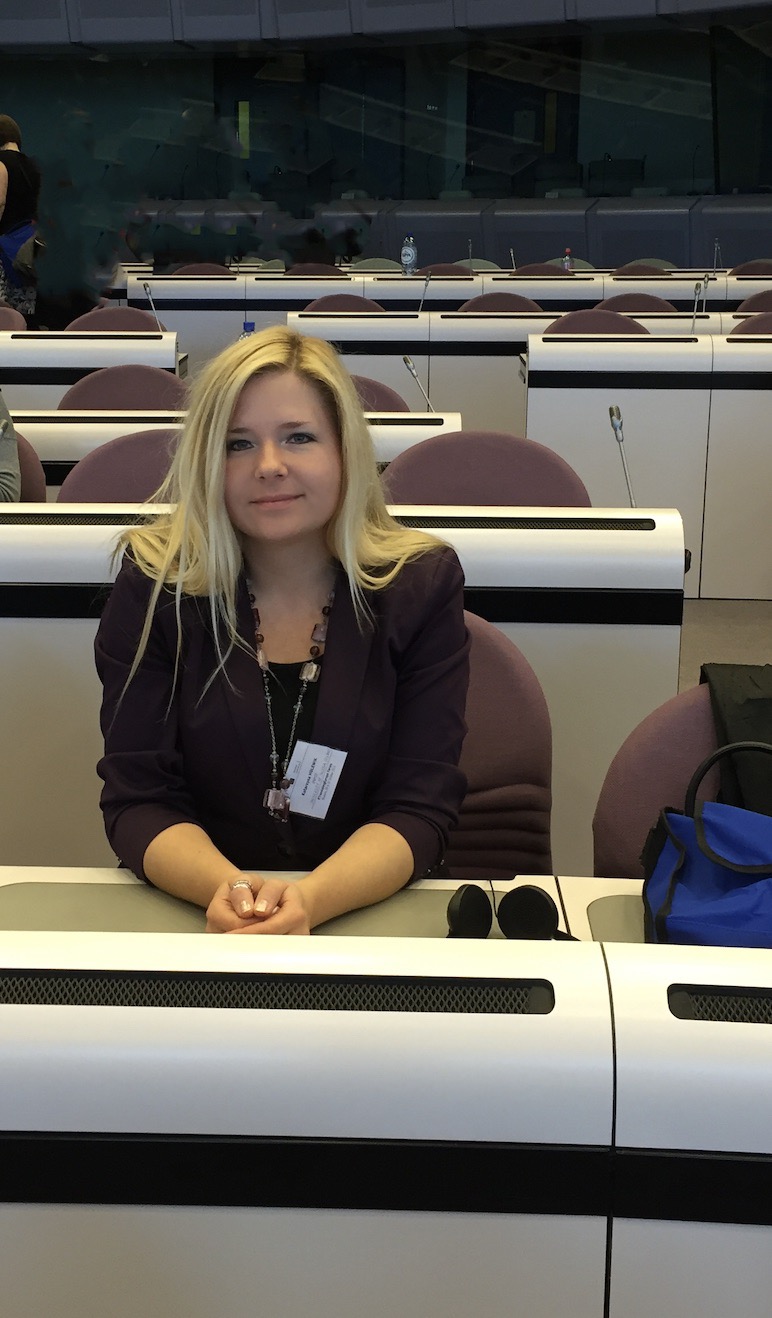Katarzyna Holewik, dr
Asystent w Instytucie Językoznawstwa UŚ
katarzyna.holewik@us.edu.pl
ORCID: https://orcid.org/0000-0003-0874-1770
https://www.researchgate.net/profile/Katarzyna_Holewik
https://scholar.google.com/citations?user=Ria0I3QAAAAJ
Academia.edu: https://wart.academia.edu/KatarzynaHolewik
Zainteresowania badawcze:
Asystent w Instytucie Językoznawstwa (kierunek: filologia angielska), tłumacz języka angielskiego,
Członek European Network for Public Service Interpreting and Translation (ENSPIT), Critical Link International, International Investigative Interviewing Research Group (IIIRG). Obecnie prowadzi badania nad rolami tłumacza i statusem przekładu ustnego dla instytucji publicznych w Polsce.
Zainteresowania naukowe: przekład ustny dla instytucji publicznych (public service interpreting) i role tłumacza, socjologia przekładu, przesłuchania policyjne z udziałem tłumacza, przesłuchania policyjne i psychologia przesłuchań, psychologia i interakcja społeczna, językoznawstwo kryminalistyczne, szkolenie tłumaczy ustnych, tutoring.
Najważniejsze publikacje:
- Holewik, K., Nowak, B. and M. Przybyła-Kasperek (2024). Teaching doctoral students: Best practices for modern education. Beyond philology: An International Journal of Linguistics, Literary Studies and English Language Teaching, Article 21. DOI: 10.26881/bp.2024.2.04
- Holewik, K. (2020). Peer Feedback and Reflective Practice in Public Service Interpreter Training. Theory and Practice of Second Language Acquisition, 6(2), 133-159. DOI: 10.31261/TAPSLA.7809
- Łyda, A. and K. Holewik (2017). (red.). Interdisciplinary encounters. Dimensions of interpreting studies. Katowice: Wydawnictwo Uniwersytetu Śląskiego.
- Holewik, K. (2017). PEACE in interpreter-mediated investigative interviews. Working together to achieve best evidence. W: Łyda, A., Holewik, K. (red.), Interdisciplinary encounters. Dimensions of interpreting studies. Katowice: Wydawnictwo Uniwersytetu Śląskiego, 78-103.
- Holewik, K. (2012). Złożoność ról i kompetencje tłumacza środowiskowego w kontekście wybranych propozycji badawczych. W: Janikowski, P. (red.), Tłumaczenie ustne – teoria, praktyka, dydaktyka. Częstochowa: Wydawnictwo Wyższej Szkoły Lingwistycznej, 45-55.
Stypendia i granty:
2019 – 2020 Projekt Ministerstwa Nauki i Szkolnictwa Wyższego „Mistrzowie dydaktyki” (Masters of Didactics – Fundamentals programme, University College London) współfinansowany ze środków Europejskiego Funduszu Społecznego, w ramach IV Osi Priorytetowej Innowacje społeczne i współpraca ponadnarodowa, Program Operacyjny Wiedza Edukacja Rozwój 2014-2020.
2022 – 2023 Projekt Ministerstwa Nauki i Szkolnictwa Wyższego „Mistrzowie dydaktyki” (Masters of Didactics – Advanced programme – Advanced University Teaching and Tutoring, University of Groningen), współfinansowany ze środków Europejskiego Funduszu Społecznego, w ramach IV Osi Priorytetowej Innowacje społeczne i współpraca ponadnarodowa, Program Operacyjny Wiedza Edukacja Rozwój.
2023 – 2024 Projekt e-SL4EU – e-Service Learning dla bardziej cyfrowego i integracyjnego szkolnictwa wyższego UE. Cel projektu – rozwinięcie Trzeciej Misji Uniwersytetu polegającej na zaangażowaniu społecznym. Projekt finansowany przez Komisję Europejską w ramach Erasmus+.
od 2024 – COST European Cooperation in Science and Technology (Europejski Program Współpracy w Dziedzinie Badań Naukowo-Technicznych); CA22128, Establishing Networks to Implement the Principles on Effective Interviewing for Investigations (ImpleMendez)
Katarzyna Holewik, PhD
Assistant at the Institute of Linguistics, University of Silesia
katarzyna.holewik@us.edu.pl
ORCID: https://orcid.org/0000-0003-0874-1770
https://www.researchgate.net/profile/Katarzyna_Holewik
https://scholar.google.com/citations?user=Ria0I3QAAAAJ
Academia.edu: https://wart.academia.edu/KatarzynaHolewik
Research interests:
Assistant at the Faculty of Humanities, Institute of Linguistics (School of English Studies), translator and interpreter, interpreter trainer. She is conducting her PhD research on the status of public service interpreting in Poland and the interpreter’s role(s). She is a member of European Network for Public Service Interpreting and Translation (ENSPIT), Critical Link International, International Investigative Interviewing Research Group (IIIRG).
Her research interests revolve around public service interpreting, the interpreter’s role from the interdisciplinary perspective, sociology of interpreting, interpreter-mediated police interviews, investigative interviewing, social psychology and interaction, forensic linguistics and psychology, interpreter training, translation and interpreting pedagogy, academic tutoring.
Publications:
- Holewik, K. (2020) Peer Feedback and Reflective Practice in Public Service Interpreter Training. Theory and Practice of Second Language Acquisition, 6(2), 133-159 DOI: 10.31261/TAPSLA.7809
- Łyda, A. and K. Holewik (2017) (eds.) Interdisciplinary encounters: Dimensions of interpreting studies.Katowice: Wydawnictwo Uniwersytetu Śląskiego.
- Holewik, K. (2017) PEACE in interpreter-mediated investigative interviews. Working together to achieve best evidence, In: Łyda, A., Holewik, K. (eds.) Interdisciplinary encounters: Dimensions of interpreting studies.Katowice: Wydawnictwo Uniwersytetu Śląskiego, 78-103.
- Holewik, K. (2012) Złożoność ról i kompetencja tłumacza środowiskowego w kontekście wybranych propozycji badawczych (The role and competencies of a community interpreter – literature overview), In: Janikowski, P. (ed.), Tłumaczenie ustne – teoria, praktyka, dydaktyka. Częstochowa: Wydawnictwo Wyższej Szkoły Lingwistycznej, 4355.
- Interdisciplinary encounters: Dimensions of interpreting studies. Andrzej Łyda, Katarzyna Holewik. Wydawnictwo Uniwersytetu Śląskiego. Katowice 2017. ISBN: 978-83-226-3228-4, pp. 190.
Interdisciplinary encounters: Dimensions of interpreting studies brings together researchers, scholars, practitioners, interpreters and interpreter trainers, who share their research results, perspectives and experiences regarding the interdisciplinarity in the field of interpreting studies. This interdisciplinarity is well reflected in the range of topics covered and research questions asked. From the interplay of interpreting and linguistics to the interplay of interpreting and psychology, to mark quite arbitrarily only two distinct epistemologies, and hence distinct methodologies.
Projects:
The Master of Didactics Project developed and financed by the Ministry of Science and Higher Education in Poland and European Social Fund (EFS), the operational programme Knowledge Education Development 2014-2020.






